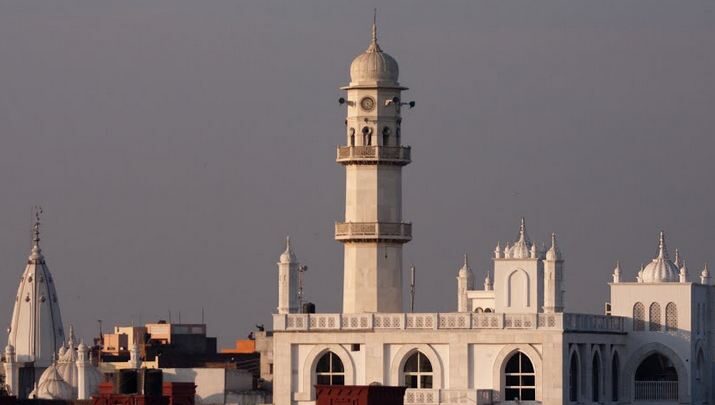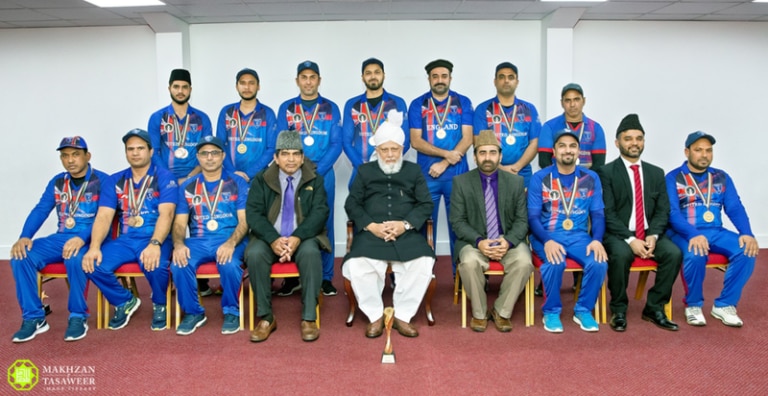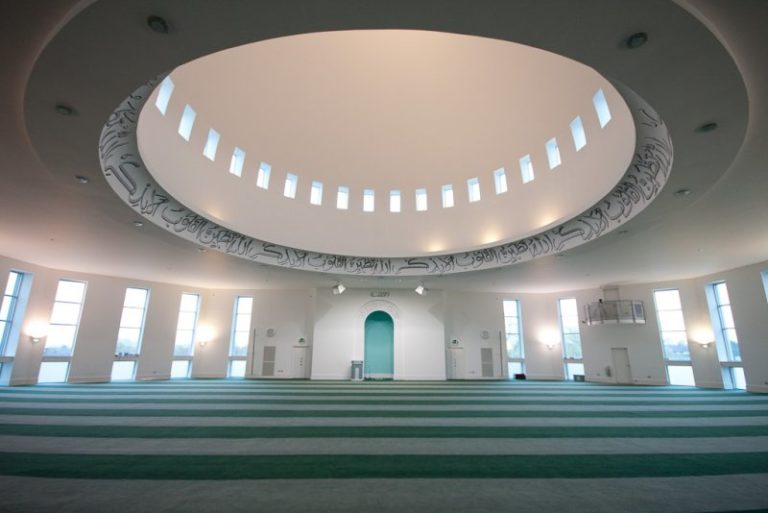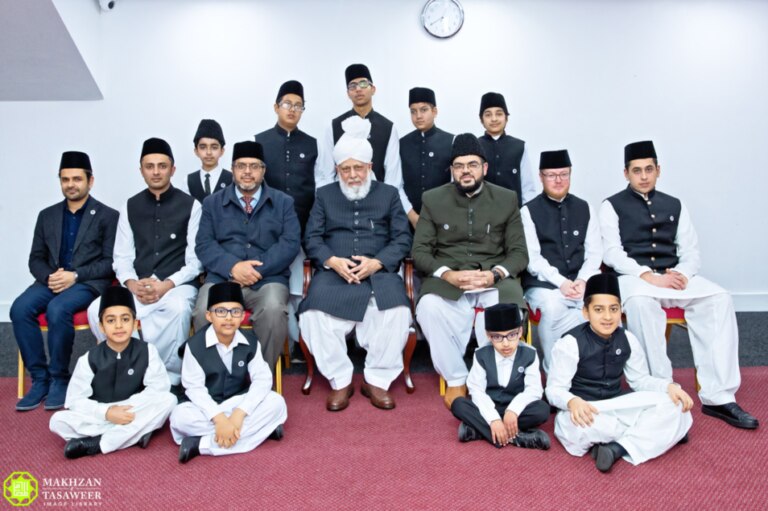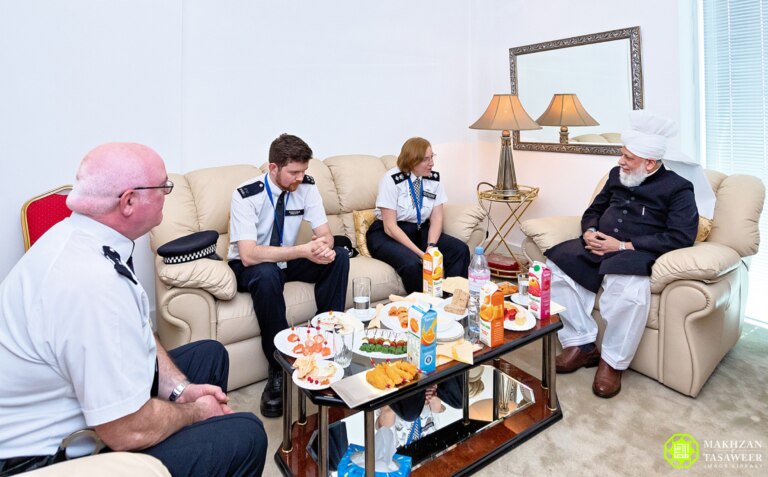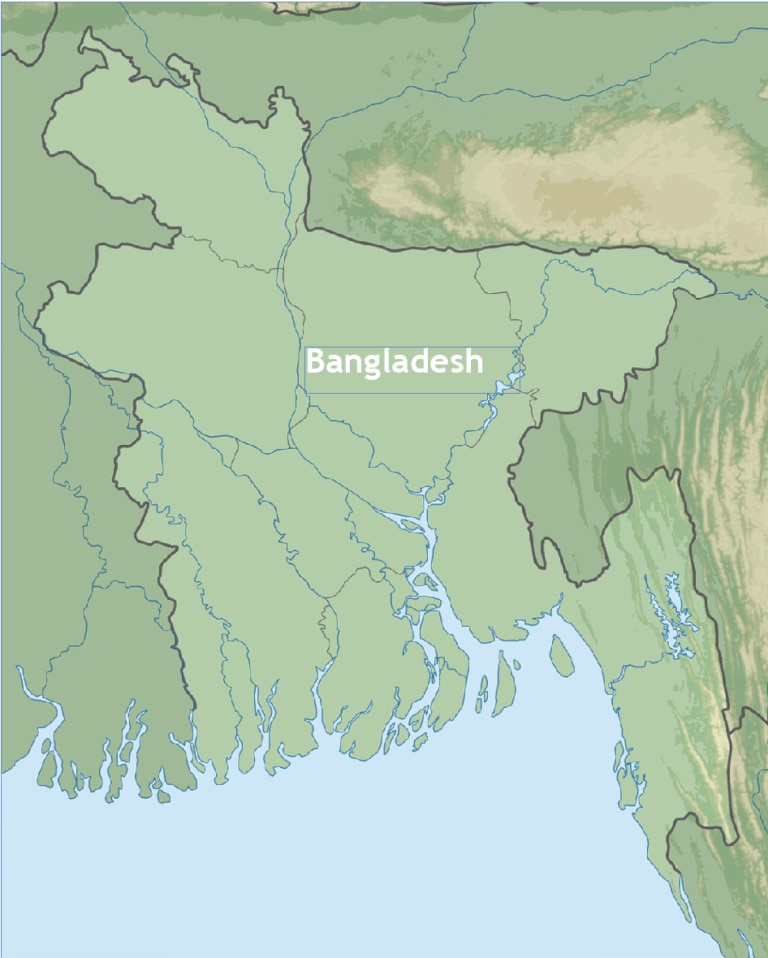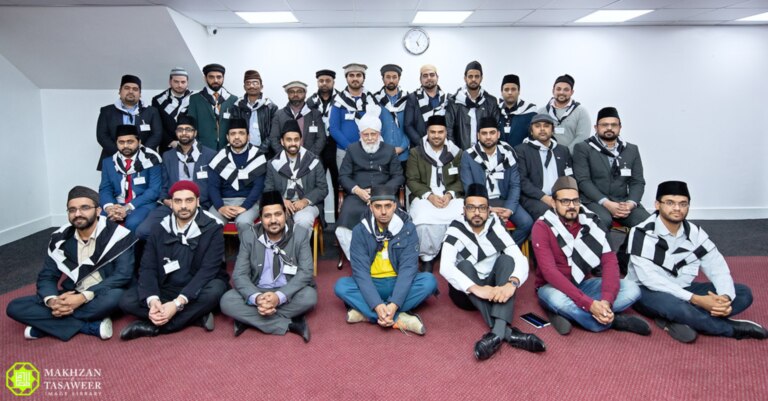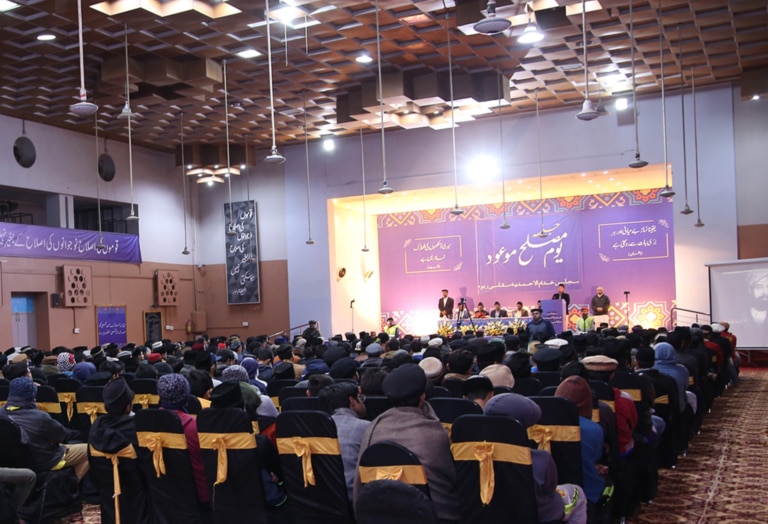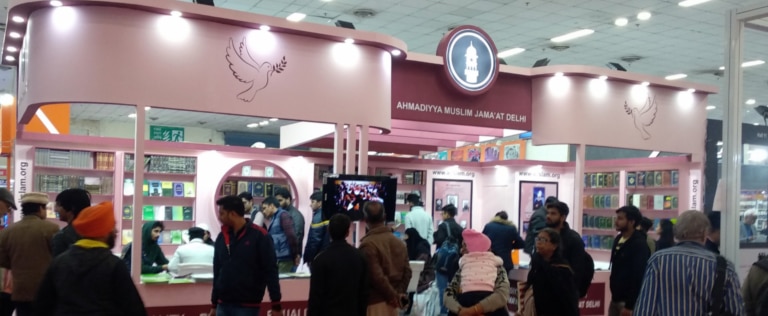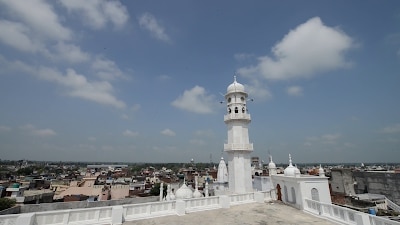Friday Sermon
1 February 2019
Men of Excellence
After reciting the Tashahud, Ta‘awuz, and Surah al-Fatihah, Hazrat Khalifatul Masih Vaa stated:
The name of the sahabi [companion of the Holy Prophetsa], who will be mentioned today, is Hazrat Abu Huzaifahra bin Utbah. His title was Abu Huzaifah. The names of Hushaim, Haashim, Qais, Hissal, I’ssal and Miqsam are also attributed to him.
His mother was known by the title Umme Safwan and her name was Fatimah bint Safwan. He had a tall stature and a beautiful countenance. He accepted Islam before the Holy Prophetsa went to Dare Arqam. (Al-Tabaqaat-ul-Kubra, Vol. 3, pp. 61-62, Dar-ul-Kutub Al-Ilmiyyah, Beirut, 1990) (Al-Mustadrak Ala Al-Sahihain, Vol. 3, p. 248, Hadith 4993, Kitab Ma’rifat Al-Sahabara, Dar-ul-Kutub Al-Ilmiyyah, Beirut, 2002) (Imtaa’ul Asmaa’, Vol. 14, p. 335, Dar-ul-Kutub Al-Ilmiyyah, Beirut, 1999)
He was among the first to accept the Holy Prophetsa. While commenting on this, Hazrat Mirza Bashir Ahmad Sahibra has written, “Abu Huzaifah bin Utbah was from the Banu Umaiyyah. His father, Utbah bin Rabi‘ah was among the chieftains of the Quraish. Abu Huzaifah was martyred in the Battle of Yamamah, which was fought against Musailimah Kazzab during the caliphate of Hazrat Abu Bakrra.” (Sirat Khatamun-Nabiyyin, Hazrat Mirza Bashir Ahmadra, p. 124)
Hazrat Abu Huzaifah participated in both the migrations to Abyssinia, while his wife, Hazrat Sahlah bint Suhail also migrated with him. (Al-Tabaqaat-ul-Kubra, Vol. 3, p. 62, Dar-ul-Kutub Al-Ilmiyyah, Beirut, 1990)
I have already given an account of the migration to Abyssinia while mentioning other companions as to how and why it took place. I will mention it here briefly. I will present a summary or some selected and abridged parts of what Hazrat Mirza Bashir Ahmad Sahibra has taken from different books of history and from the Ahadith.
He writes, “When the suffering of the Muslims had reached its limit and the Quraish continued to aggravate the affliction of the Muslims, the Holy Prophetsa instructed Muslims to migrate to Abyssinia, and said, ‘The king of Abyssinia is just and equitable. None are subjected to oppression under his rule.’ … During that era, a strong Christian sovereignty was established in Abyssinia and the king was referred to as the Negus … Arabia had business relations with Abyssinia … During that time (when they migrated), the personal name of the Negus was Ashamah, who was a just, intelligent and powerful king. In any case, when the pains of the Muslims reached their limits, the Holy Prophetsa instructed that those who could afford should migrate to Abyssinia. Therefore, upon the instruction of the Holy Prophetsa, in the month of Rajab 5 Nabawi, eleven men and four women migrated to Abyssinia. The well-known names among them were as follows: Hazrat Uthman bin Affan and his wife Ruqayyah, the daughter of the Holy Prophetsa, Abdur-Rahman bin Auf, Zubair bin Al-Awwam, Abu Hudhaifah bin Utbah”, the account of whom I am currently narrating. He was also part of this first group, “Uthman bin Maz‘oon, Mus‘ab bin Umair, Abu Salamah bin Abdul-Asad and his wife Umme Salamah.”
Hazrat Mirza Bashir Ahmad Sahibra writes, “It is very strange that a majority of these pioneer immigrants were those who belonged to powerful tribes of the Quraish, and the weaker were few and far between. This illustrates two things: firstly, even those who belonged to the powerful tribes of the Quraish were not safe from the cruelties of the Quraish. Secondly, weak people such as slaves, etc., at that time were in such a grave state of weakness and misery that they were not even able to migrate.
“Travelling south, when the immigrants reached Shu‘aibah, which was a sea-port in Arabia at that time, by the grace of Allah they found a trade ship which was just ready to leave for Abyssinia and thus, all of them boarded in security … Upon reaching Abyssinia the Muslims found a life of great peace and protection from the cruelties of the Quraish after much difficulty and prayers. However, as some historians have mentioned, it had not been long since the immigrants had migrated to Abyssinia, when a wandering rumour reached them that all of the Quraish had accepted Islam, and Mecca was now a place of complete peace and security. The result of this news was that most immigrants returned immediately.”
Hazrat Mirza Bashir Ahmad Sahibra has shed some light of this rumour as to how and why it spread. Having consulted various books of history, he writes, “In actuality, although this was a completely false and unsubstantiated rumour, which was probably spread in order to lure the immigrants to Abyssinia back and to put them in difficulty. As a matter of fact, on closer investigation, this rumour and the tale of the immigrants’ return, in itself, seems to be baseless. (He further states) Nonetheless, if it is taken as true, the incident mentioned in various Ahadith could be hidden beneath the surface. As mentioned in Bukhari, once the Holy Prophetsa recited verses of Surah an-Najm in the courtyard of the Ka‘bah. At that time, many a chieftain of the infidels were also present, along with the Muslims. When the Holy Prophetsa completed the chapter, he fell into prostration (upon completing Surah an-Najm) and with him all the Muslims and infidels fell into prostration as well. The reason behind the prostration of the disbelievers has not been mentioned in Ahadith, but it seems that apparently the Holy Prophetsa recited the verses of God in such a manner as touched the cords of heart. Those verses were such as particularly illustrated the Unity of God, His Power, and Majesty in an extremely eloquent and perspicuous manner, and His favours were reminded of. Then, the Quraish were warned in a very majestic and awe-inspiring manner, that in case they did not refrain from their evil doings they would meet the same end as past nations because they rejected the messengers of God. Then, at the conclusion of these verses it was ordered that come and prostrate before Allah. After the recitation of these verses, the Holy Prophetsa and all the Muslims fell into prostration at once, and as a result, these words and this sight had such a miraculous effect on the Quraish, as they also fell into prostration involuntarily.”
Hazrat Mirza Bashir Ahmad Sahibra writes: “This should not be surprising, for under such circumstances, as have been mentioned above, the human heart, at times, falls in awe and powerlessly commits such a deed as is against its actual principles and religion. Therefore, at times, we have witnessed that during a severe and sudden affliction, even an atheist cries out, ‘O God! O God!’ or ‘O Ram Ram [name of a Hindu deity]!’ The Quraish were not even atheist, and they actually believed in the being of God, although they associated the idols with Him.”
We observe this even today that when speaking to some atheists, they are asked if the name of God came to their minds or at the tip of their tongues, when they were afflicted with some sudden affliction, they concede that this was indeed the case. Thus, this was due to the effect of the recitation of that Surah, the words of the Surah and the action of the Muslims that the chieftains of the disbelievers also fell in prostration along with everyone else.
“Hence, after the recitation of this majestic word, full of awe, the community of Muslims all at once fell into prostration; it had such a miraculous effect, that the Quraish powerlessly fell into prostration as well. However, such an influence is usually temporary, and man quickly returns to his original state. As such, same was the case here, for when the Quraish rose from prostration, they remained the very same idolaters they were before.
In any case, this occurrence is such as is substantiated by authentic Ahadith. Hence, if the news of the return of the immigrants to Abyssinia is in fact true, it seems that the Quraish, who were ever-longing to have the immigrants of Abyssinia return, probably utilised this action to spread the rumour that the Quraish of Mecca had become Muslim, and that Mecca was now completely safe for Muslims. When this rumour reached the immigrants of Abyssinia, they were naturally delighted to hear it, and in the fervour of their delight, they quickly returned. When they were near Mecca, they were enlightened of the actual matter at hand, upon which some secretly, and others under the protection of a powerful and influential chieftain of the Quraish, entered Mecca, while others set back again. Therefore, if there was any truth in the rumour that the Quraish became Muslim, it was merely confined to the incident of the prostration upon the recitation of Surah an-Najm. And Allah knows best.
In any case, if the immigrants of Abyssinia did in fact return, a majority of them set back again. Moreover, since the Quraish continued to progress in their infliction of suffering, and their tyrannies were increasing day by day, other Muslims, upon the instruction of the Holy Prophetsa, began secret preparations to migrate as well. They began to leave gradually whenever they could find an opportunity to do so. This chain of migration began in such a manner that ultimately the number of immigrants to Abyssinia reached one hundred and one, eighteen of which were women. Very few Muslims were left in Mecca with the Holy Prophetsa. Some historians have called this migration ‘The Second Migration to Abyssinia.” (Sirat Khatamun-Nabiyyin, Hazrat Mirza Bashir Ahmadra, pp. 146-149)
There was the first migration and then another group of people followed them. Likewise, when afterwards the permission was granted for the migration to Medina, Abu Huzaifah and Hazrat Saalimra, who was his freed slave, both migrated to Medina. They initially migrated to Abyssinia, but they returned during the same period. Their second migration was towards Medina, where both of them stayed at the house of Hazrat Abbad bin Bishr. The Holy Prophetsa formed a bond of brotherhood between Hazrat Abu Huzaifah and Hazrat Abbad bin Bishr. (Al-Tabaqaat-ul-Kubra, Vol. 3, p. 62, Dar-ul-Kutub Al-Ilmiyyah, Beirut, 1990)
Hazrat Abu Huzaifah also participated in the expedition of Hazrat Abdullah bin Jahash. (Sirat Ibn Hisham, p. 286, Bab Sirya Abdullah bin Jahashra, Dar Ibn Hazam, Beirut, 2009)
I will present the details and background to the expedition of Abdullah bin Jahash as mentioned in Sirat Khatamun-Nabiyyin:
“A chieftain of Mecca named Kurz bin Jabir Fihri very cunningly along with a company of the Quraish, suddenly raided a pasture of Medina, which was situated only three miles from the city and fled with camels, etc., belonging to the Muslims. As soon as the Holy Prophetsa received news of this, he appointed Zaid bin Harithahra as the Amirin his absence, and set out in his pursuit along with a group of the Companions. The Holy Prophetsa pursued him until he reached Safwan which is an area close to Badr, but he made good his escape. This ghazwah [expedition]is also known as Ghazwah Badr-ul-Ula.”
It is further written: “This raid of Kurz bin Jabir was not a minor Bedouin act of plunder,” it was not the case that a Bedouin came to loot and committed this theft out of his sheer ignorance, “rather, it is definite that he had set out against the Muslims on behalf of the Quraish, with a particular motive. As a matter of fact, is it very likely that he had specifically come with the intention of inflicting injury upon the very person of the Holy Prophetsa, but upon finding the Muslims vigilant, settled upon the robbery of their camels and ran off. This also demonstrates that the Quraish of Mecca had planned to raid Medina so as to utterly destroy the Muslims.
“Naturally, the sudden attack of Kurz bin Jabir had terrified the Muslims greatly, and since there was a standing threat by the chieftains of Mecca that they would attack Medina and utterly destroy the Muslims, the Muslims were severely apprehensive. Upon observing these very threats, the Holy Prophetsa decided that the movements of the Quraish should be surveyed from a closer distance,” in order to decipher their plans and intentions. In order for this there should be measures in place to observe their activities from close, “so that all the necessary intelligence with respect to them may be available on time and Medina was safeguarded from all kinds of sudden attacks. Hence, for this purpose, the Holy Prophetsa assembled a party of eight muhajirin [migrants]. As an act of wisdom, the Holy Prophetsa selected such men for this party who were from the various tribes of the Quraish, so that it was easier to obtain intelligence with regard to the hidden conspiracies of the Quraish. The Holy Prophetsa appointed his paternal cousin, Abdullah bin Jahashra as the commander of this party.” Huzaifah bin Utbah was also present in this expedition. “In order to ensure that the prime mission of this party was kept secret even from the Muslim masses, upon ordering this sariyyah [expedition], the Holy Prophetsa did not even inform the commander of this party as to where he was being sent and for what purpose. Rather, upon their departure, the Holy Prophetsa handed him a sealed letter and said, (explaining the direction of travel) ‘This letter contains necessary instructions for you. When you cover a distance of two days travel from Medina, open the letter and act in accordance with the stipulated instructions.’As such, Abdullahra and his companions set out by the command of their master. When they had journeyed a distance of two days from Medina, Abdullahra opened the instructions of the Holy Prophetsa, which were as follows:
‘Go forth to the Valley of Nakhlah between Mecca and Ta’if, and obtain information on the Quraish and return with news therefrom.’
“Moreover, since an intelligence mission so close to Mecca was a very delicate task, at the bottom of this letter, the Holy Prophetsa had written that after the objective of this mission became known, if any one from among his companions was hesitant in accompanying this party and desired to return, then permission would be granted to do so. Abdullahra read out this guidance to his companions who unanimously affirmed, ‘We happily present ourselves for this service.’Then, this party proceeded to Nakhlah.
“Sa‘d bin Abi Waqasra and Utbah bin Ghazwanra lost their camels en-route, and were separated from their companions. Despite their best efforts, they were unable to relocate their companions. The party was now left with only six people.” These six proceeded with the task at hand. “This small community reached Nakhlah and became engaged in their work” i.e. to gain intelligence about the intentions of the disbelievers of Mecca and whether they had any plans to attack Medina. “With the thought of concealing their classified mission, some of them shaved their heads, so that travellers, etc., would not be alarmed in any way, and so that they would consider them as being such people who had come with the intention of Umrah.” They shaved their heads so that other people would think that they were travelling to perform Umrah.
He further says: “However, they had only just arrived there, when suddenly a small caravan of the Quraish also happened to arrive, which was travelling from Ta’if to Mecca, and both parties encountered each other.” They realised that this was a group of Muslims and resolved to fight with them.
“The Muslims consulted one another as to what should be done. The Holy Prophetsa had sent them for the purpose of secretly obtaining intelligence, but on the other hand, war had begun with the Quraish. Both opponents were before one another and naturally there was a risk that now, since the people from the caravan of the Quraish had spotted the Muslims, their covert intelligence mission would no longer remain secret. Another predicament was that some Muslims thought that it was perhaps the last day of Rajab, i.e., a sacred month in which fighting was prohibited as per the ancient Arabian custom. Others thought that Rajabhad passed and the month of Sha‘banhad started. In some narrations it has been related that this sariyyah was dispatched in Jamadiyul-Akhir, and there was a doubt as to whether this day was of Jamadi or Rajab. However, on the other hand, the Valley of Nakhlah was situated right on the outskirts of the Haram and it was obvious that if a decision was not made that day, the caravan would have entered the Haram on the following day, the sanctity of which was definite. Hence, taking all of these factors into consideration, these six Muslims eventually decided that the caravan should be attacked, and the people of the caravan should either be taken captive or killed. Therefore, they launched an attack in the name of Allah, and as a result, one man, whose name was Amr bin Al-Hadrami was killed, and two were taken captive. However, the fourth individual escaped, and the Muslims were unable to apprehend him.” Thus, their decision to capture them or kill them was not successful in its entirety. “Thereafter, the Muslims seized the goods of the caravan. Since one man belonging to the Quraish had escaped and news of this conflict would inevitably reach Mecca quickly, Abdullah bin Jahashra and his companions swiftly returned to Medina with the spoils.”
Orientalists often raise the allegation that this party was sent with the intention of attacking the caravan, which is absolutely incorrect. The truth of the matter is that when the Holy Prophetsa found out that the Companions had attacked the caravan, he was extremely displeased.
“As such, it is narrated that when they presented themselves before the Holy Prophetsa and informed him of the entire account, the Holy Prophetsa was extremely displeased and said: ‘I have not given you permission to fight in the Sacred Month.’”
It isthen stated that he refused to accept the spoils of war saying: “I will not accept anything from this.” Upon this, Abdullahra and his companions felt extreme remorse and shame. Then it is written,
“They thought that due to their incurring the displeasure of God and His Messenger, they had been ruined.” They became extremely worried.
Even the other companions reproached them and said:
“You did that which you had not been ordered, and you fought in the Sacred Month, although you had not been ordered at all to fight in this campaign.”
On the other hand, the Quraish also raised a huge hue and cry, that the Muslims had violated the sanctity of the Sacred Month. Since the person who had been killed, Amr bin Al-Hadrami, was a chieftain, and was also a confederate of Utbah bin Rabi‘ah, a chieftain of Mecca, this occurrence greatly enraged the Quraish’s fire of fury. They began to prepare for an attack upon Medina with even greater zeal and uproar.”
Nonetheless, owing to this incident, there were intense discussions between the Muslims and the disbelievers over the fact that the Muslims had launched an attacked in the Sacred Month. In Sirat Khatamun-Nabiyyin, Hazrat Mirza Bashir Ahmad Sahibra writes: “Finally the following Quranic verse was revealed, which provided a means of relief for the Muslims:
يَسْـَٔلُوۡنَكَ عَنِ الشَّهۡرِ الْحَرَامِ قِتَالٍ فِيۡهِ ؕ قُلْ قِتَالٌ فِيۡهِ كَبِيۡرٌ ؕ وَصَدٌّ عَنۡ سَبِيۡلِ اللّٰهِ وَكُفْرٌۢ بِهٖ وَالْمَسْجِدِ الْحَرَامِ وَ اِخْرَاجُ اَهۡلِهٖ مِنْهُ اَكْبَرُ عِنۡدَ اللّٰهِ ۚ وَ الْفِتْنَةُ اَكْبَرُ مِنَ الْقَتْلِ ؕ وَلَا يَزَالُوۡنَ يُقَاتِلُوۡنَكُمْ حَتّٰي يَرُدُّوۡكُمْ عَنۡ دِيۡنِكُمْ اِنِ اسْتَطَاعُوۡا ؕ
‘People ask thee about fighting in the Sacred Month. Tell them: “Undoubtedly, fighting in the Sacred Month is a great transgression, but to forcefully hinder men from the religion of God in the Sacred Month; rather, to disbelieve in relation to the Sacred Month and the Sacred Mosque, i.e., to violate their sanctity, and then to turn out by coercion, the inhabitants of the Haram, as you are guilty of doing, O ye idolaters, is a greater sin with Allah than fighting in the Sacred Month; and verily, to persecute in the land during the Sacred Month is worse than such fighting, which is for the purpose of preventing persecution. O Ye Muslims! The state of the disbelievers is such that they have become so blinded in their enmity towards you that they will not cease fighting you at any time and at any place, until they turn you back from your faith, if they find the power to do so.”’ (Surah al-Baqarah, Ch.2: V.218)
Therefore, history establishes that the chieftains of the Quraish would spread their bloody propaganda even in the Sacred Months. As a matter of fact, they became even more active in their evil designs during these months, taking benefit of the gatherings and journeys which would take place in the Sacred Months. Furthermore, with great shamelessness, in order to gratify themselves with a false satisfaction, they would re-arrange the order of the Sacred Months, which was known as Nas’i.”
Until the conquest of Mecca, they continued to treat the Muslims in the same way, or rather they transgressed all limits. In fact, Hazrat Mirza Bashir Ahmad Sahibra writes:
“Later on they crossed all bounds, when during the era of the Treaty of Hudaibiyyah, despite there being a firm covenant and agreement, the disbelievers of Mecca and their allies took up the sword against an ally tribe of the Muslims, in the area of the Haram. Hence, it was only natural for the Muslims to find comfort in this response revealed by God Almighty, but the Quraish were also brought to level. During this time, two of their men arrived in Medina in order to have their two captives released.” These were the two people who were captured by the Muslims. “However, until now, Sa‘d bin Abi Waqasra and Utbahra had not returned”; their camels had become lost and there was no trace of them. “On their account, the Holy Prophetsa greatly feared that if the Quraish happened to seize them, they would not release them alive. Hence, for this reason, the Holy Prophetsa refused to release the captives until they returned.”
When the Quraish came to free their captives, the Holy Prophetsa refused to return them until both of them [i.e. Sa‘d bn Abi Waqas and Utbah] returned. He said:
“‘When my men safely reach Medina, I will release yours.’ Therefore, when they both reached Medina, the Holy Prophetsa released both captives for a ransom. However, from among these two captives, one individual was so deeply impressed by the high moral qualities of the Holy Prophetsa and the truth of the Islamic teaching during his stay at Medina, that even after his release, he refused to return, and joined the servants of the Holy Prophetsa. He was eventually martyred at Bi‘r-e-Ma‘unah. His name was Hakam bin Kisanra.” (Sirat Khatamun-Nabiyyin, Hazrat Mirza Bashir Ahmadra, pp. 330-334)
If they were coerced to accept Islam through force and oppression, then they would not have accepted Islam in this manner. Regarding Abu Huzaifara, it is also said that on the day of the Battle of Badr, he marched ahead to fight against his own father – his father was not a Muslim and had come with the non-believers – however, the Holy Prophetsa stopped him and said that someone else should fight against his father instead. Subsequently, Abu Huzaifa’s father, uncle, brother and nephew were all killed during the Battle of Badr. Hazrat Huzaifara demonstrated great patience and whilst remaining content with the will of God Almighty, he expressed his gratitude to Him for the help He had granted in favour of the Holy Prophetsa i.e. the victory in the Battle of Badr. (Tathbit Dala’il Al-Nubuwwah Az Abdil Jabbar, Vol. 2, p. 585, Darul Arabiyyah, Beirut)
In another tradition, this incident has been narrated by Ibn Abbas. He states:
“On the day of Badr, the Holy Prophetsa said, ‘Whosoever from among you comes up against Abbas, do not kill him, because he has come for battle out of compulsion. So take him captive but do not kill him.’” When this news reached Hazrat Abu Huzaifa ra, he did not say it directly to the Holy Prophetsa but said to someone with him, ‘Are we to spare Abbas and yet be expected to kill our own fathers, brothers and relatives? What is this matter? If confronted [in battle], I swear to God, I will surely kill him.” When the Holy Prophetsa heard of this, he said to Hazrat Umarra: “O Abu Hafs! Will someone attack the face of the Uncle of the Messenger of Allahsa?” Hazrat Umarra states that this was the first instance that the Holy Prophetsa granted him the title, ‘Abu Hafs’. Hazrat Umarra responded: “O Messenger of Allah! Please allow me to sever his head with my sword. I swear by God that the person who uttered this is a hypocrite.” Hazrat Abu Huzaifah used to say: “The Prophet of Allahsa forbade Hazrat Umar to do so. However, I did not remain in peace due to what I had stated.” (He had realised that the statement he made was inappropriate) and was unable to remain in peace. “I shall always remain fearful due to evil consequence of this statement, unless I attain martyrdom.” This meant that he believed that only by sacrificing his life for the sake of Islam would assure protection from the evil ramifications of his comment. The narrator states: “Hence, he attained martyrdom during the battle of Yamama.” (Al-Mustadrak Ala Al-Sahihain, Vol. 3, pp. 247-248, Hadith 4988, Dar-ul-Kutub Al-Ilmiyyah, Beirut, 2002)
He said something in a state of emotion, but remained fearful his entire life until the day of his martyrdom.
Hazrat Aishara narrates: “The Prophet of Allahsa commanded that the bodies of the idolaters should be thrown into a pit and it was carried out as commanded. The Holy Prophetsa stood by them and addressing them stated: “O dwellers of the pit! Do you see the promise made by your lord – i.e. the idols – to be true? Surely, I find the promise of my Lord to be true.” If one was to infer Allah Almighty from this statement, then it meant punishment for the disbelievers. The Holy Prophetsa said: “Allah Almighty had promised me that ‘I will punish them and they will not be victorious over you.’” The Companions asked: “O Messenger of Allah! Are you addressing those who are deceased.” The Holy Prophetsa stated: “The dwellers of the pit have certainly come to know that the promise your Lord had made to you has been fulfilled.” When they were being thrown into the pit, as per the command of the Holy Prophetsa, there were signs of disapproval on Hazrat Abu Huzaifah’s face because his father was amongst them as well. The Holy Prophetsa asked him: “O Abu Huzaifah! By God, it appears you dislike this treatment towards your father.” Hazrat Abu Huzaifah responded: “O Messenger of Allahsa! I swear by God that I have no doubts about Allah and His Messengersa, but my father was forbearing, truthful and a person of wise judgement. Whatever he considered being correct, he firmly believed in it. He did not harbour evil intentions, and I wished for Allah to guide him towards Islam before his demise. When I realised that this would no longer be possible and witnessed his end, it saddened me.” When the Holy Prophetsa heard this, he offered a prayer in favour of Hazrat Abu Huzaifah. (Al-Mustadrak Ala Al-Sahihain, Vol. 3, p. 249, Hadith 4995, Dar-ul-Kutub Al-Ilmiyyah, Beirut, 2002)
Hazrat Abu Huzaifahra was able to participate in all the battles alongside the Holy Prophetsa, and he was martyred at the age of fifty-three or fifty-four in the battle of Yamama, during the Caliphate of Hazrat Abu Bakr Siddiqra. Al-Tabaqaat-ul-Kubra, Vol. 3, p. 62, Dar-ul-Kutub Al-Ilmiyyah, Beirut, 1990)
Now I will speak about a long-standing servant and noble member of the Jamaat who passed away a few days ago. His name is Professor Saud Ahmad Khan Sahib Dehlvi. He passed away on 21 January, as per the will of God. Surely, to Allah we belong and to Him shall we return.
His father, Hazrat Muhammad Hassan Aasaan Dehlvira was a companion of the Promised Messiahas. Similarly, his paternal grandfather, Hazrat Mahmood Hassan Khan Sahibra, a teacher in Patiala, was also a companion of the Promised Messiahas.
The Promised Messiahas listed his name amongst the 313 companions at number 301 stating “Maulavi Mahmood Hassan Khan Sahib, a teacher serving in Patiala”. (Zameema Risala Anjam-e-Atham, Ruhani Khaza’in, Vol. 11, p. 328)
In his book, Siraj-e-Munir, the Promised Messiahas listed his name in the list of those who offered Chanda for the hospitality and food for guests by writing: “Maulawi Mahmood Hassan Khan Sahib, Patiala.” (Siraj-e-Munir, Ruhani Khaza’in, Vol. 12, pp. 85-86)
Professor Saud Khan Sahib’s father, Hazrat Muhammad Hassan Sahib Aasaan Dehlvira had the opportunity to travel to Qadian when he was approximately 10 or 12 years old and witness first-hand the great sign of the Revealed Sermon. (Ne’i zindagi az Mas’ud Hasan Khan Dehlwi, p. 107, Lajna Imaillah Lahore, 2007)
Professor Saud Khan Sahib devoted his life for the Ahmadiyya Community in 1945. He obtained BA hons in Persian from Aligarh.
In 1955, while talking about him and his brothers during a Friday sermon, Hazrat Musleh-e-Maudra stated: “I believe that Master Muhammad Hassan Aasaan Sahib has displayed a model which is praiseworthy. He was an ordinary teacher and a poor man. He would starve himself in order to educate his children. Upon graduation, he devoted four out of his seven sons for the service of the Ahmadiyya Community. All four of them are currently serving the faith and almost all of them are serving with the sincerity, fulfilling the true spirit of life devotion.”
Huzoorra continued by saying: “If these children were not life devotees of the Ahmadiyya Community, then perhaps they would have kept the name of their father alive for 20 years and would have said: ‘Our father was an excellent man.’” Hazrat Musleh-e-Maudra says, “However, when this Friday Sermon of mine is published, hundreds of thousands of Ahmadis will remember the name Muhammad Hassan Aasaan and will praise him. They will say: ‘Look how courageous of an Ahmadi he was for he sent his children to obtain higher education even though he was poor himself, then offered them all for the service of the Ahmadiyya Community,” (i.e. he devoted them all). Moreover, those children proved to be pious as they happily accepted their father’s sacrifice and supported his decision of devoting them for the sake of the Ahmadiyya Community.” (Nai Zindagi az Mas‘ud Hasan Khan Dehlwi, p. 208, Lajna Imaillah Lahore, 2007)
Between June 1946 and October 1949, Saud Khan Sahib taught in Talim-ul-Islam High School in Qadian. In October 1949, he spent a few months teaching English in Jamia Ahmadiyya. In 1950 Hazrat Khalitaful Masih IIra sent him to Ghana in West Africa to render services to his faith. (Tarikh-e-Ahmadiyyat, Vol. 14, p. 286) He served as the first vice principal of the Ahmadiyya Secondary School in Ghana. He departed from Karachi on 30 April 1950 and arrived in Kumasi on 30 June. In other words, it took two months, the months of May and June, to complete his journey. Nowadays we can arrive in five or six hours. On 1 July he began teaching in the Ahmadiyya Secondary School. (Nai Zindagi az Mas‘ud Hasan Khan Dehlwi , pp. 276-277, Lajna Imaillah Lahore, 2007)
With regard to why his journey took so long, his nephew, Irfan Khan writes: “After his first appointment Saud Sahib departed from Rabwah to Ghana and only reached Kumasi after three extremely difficult and arduous months (it was approximately two months). In those days, one would have to board various ships in order to reach their destination. They would travel by ship as opposed to aeroplanes. Therefore, he left Karachi and travelled to Aden. He bought a ticket costing 160 rupees, which did not come with any meals. In order to reach Ghana, he not only travelled by ship, but also used other modes of transport such as buses, trucks and aeroplanes, and eventually reached Nigeria. In order to acquire the £55 aeroplane ticket to reach Nigeria, he had to sell his trunk and other belongings, and kept all his personal belongings in a sheet. The mission house in Nigeria then bought him a bus ticket to Ghana.”
In order to reach Nigeria, he sold his possessions to travel some of the distance by plane. He then took a bus from Nigeria to Ghana. His name is at the top of the list in Tarikh-e-Ahmadiyyat among the eight missionaries sent to East Africa, West Africa and Holland in 1950. In the first entry it is written Saud Khan Sahib (departed Lahore on 25 Amaan 1329 AH) to Ghana. (Tarikh-e-Ahmadiyyat, Vol. 14, p. 286)
He returned to Pakistan in 1958 as per the instructions of Hazrat Musleh-e-Maudra and completed his MA in history from Punjab University. He completed his MA in history. His father, Muhammad Hassan Aasaan Dehlvi Sahib passed away in August 1955 whilst Saud Sahib was in Ghana. In 1961 he was re-appointed to serve in Ghana where he was again enabled to render great services to his faith, until 1968.
During his tour of Europe, Hazrat Khalifatul Masih IIIrh approved a sitting to be held in Masjid Mubarak, Rabwah after every Maghrib prayer, in which there would be a 15-minute lecture on issues relating to moral training. This programme began on 7 July and it drew much interest as it was a scholarly lecture. Saud Sahib was also among the learned scholars who delivered speeches in this program. (Tarikh-e-Ahmadiyyat, Vol. 24, pp. 392-393)
On the occasion of the Jalsa Salana, arrangements were made for translation of the speeches and Saud Sahib had the honour of translating the address of Hazrat Khalifatul Masih IIIrh into English and he was blessed with this opportunity until the last Jalsa Salana held in Rabwah.
Among the students of professor Saud Khan Sahib Dehlvi was Respected Abdul Wahab Adam Sahib of Ghana and BK Addo Sahib, who also resided here. After returning to Pakistan in 1968, professor Saud Khan Sahib Dehlvi was given the responsibility of teaching in Talim-ul-Islam College by Hazrat Khalifatul Masih IIIrh in 1969.
Hazrat Khalifatul Masih IVrh appointed him as an English teacher for one year in Jamia Ahmadiyya. Whilst he served as a professor in Jamia Ahmadiyya, he was still teaching in Talim-ul-Islam College. His duty in Jamia Ahmadiyya started on 2 March 1987 and he served for one year. Regarding professor Saud Khan Sahib Dehlvi, his elder brother Masood Khan Dehlvi Sahib; who was the former editor of the Al Fazl newspaper and passed away a few years ago, would often say, “My brother, Saud Ahmad, is a mobile library”. He had vast knowledge and was highly educated. His daughter Rashida Sahiba writes, “My father was an extremely forbearing and humble man and a learned scholar. He was very devoted and regular in his worship and his Tahajjud prayers. He was extremely hospitable to his guests and had a balanced temperament”. What she has written is absolutely correct.
His nephew, Nafees Ahmad Ateeq Sahib, who is a missionary, writes, “He [Saud Sahib] was an incredibly humble and pious individual, who had great trust in God Almighty. He was a very righteous and modest human being. His devotion and passion for service to the faith are an example for all life-devotees.” He also writes, “He once told me that clothes and other commodities should be used according to one’s need. It does not behove a life-devotee to follow fashion and lavishness. Modesty was an outstanding quality of his.”
IK Gyasi Sahib, a Ghanaian student of Saud Sahib writes, “Between 1950 to 1955, Saud Sahib was the very first Assistant Headmaster or Naib Principal of the Talimul Islam Secondary School in Kumasi and prior to this Dr SP Ahmad Sahib was the Headmaster. Saud Sahib was an extremely hard-working and an excellent scholar of the English language, English history, and European history and I was among the ones whom he taught.” He then writes, “In terms of English grammar, especially sentence analysis, I have not seen anyone like him. He played a major role in improving my language skills.”
Mubashar Ayyaz Sahib, the current Principal of Jamia Ahmadiyya Senior Section in Rabwah writes, “Professor Saud Khan Sahib was a very humble and respected man and a scholar. I too was a student when he taught in Jamia Ahmadiyya and throughout his time in Jamia, he would always start his classes on time. He would continue teaching until the last minute of the lesson, and if ever students would try to engage him in conversation other than their studies, rather than rebuking them harshly or telling them off, Saud Sahib would overlook it in the politest manner and continue teaching.” He further writes, “I noticed that he had tremendous respect for the students who had devoted their lives and if he ever had to be strict and tell someone off, he would always do so whilst keeping their self-respect and dignity in mind.” Then Mubasher Sahib writes, “In the early days of MTA when a range of programmes were being recorded, Saud Khan Sahib held programs on the topic of Sirat-un-Nabi. Despite his old age, he would prepare entire programmes with great effort and allocate questions to us, having hand-written them all in advance.”He further writes:
“At times, whilst preparing for the programmes, the atmosphere would become tense as each person would insist in doing it their own way, however, he was so gentle and filled with such extreme humility that he would never express any anger on his face. From his expression it would seem as though nothing had happened. If ever anyone said something harsh he would gently smile and continue with the recording of the programme from where it had stopped.”
Upon the demise of professor Saud Khan Sahib, his neighbour, Fazl Ilahi Malik Sahib expressed his sentiments in a very emotional manner and said that it was very rare to find such neighbours. He had a very simple nature and was a scholarly individual. He is survived by one daughter and two sons. One of his sons, Saad Saud Sahib, is serving as a local president of a Jamaat in the UK.
May God Almighty elevate the station of the deceased. As I mentioned earlier, his qualities and attributes were in actuality far greater than what has been mentioned. He showed extraordinary love and obedience for Khilafat which was exemplary. May God Almighty enable his children and future progeny to always remain attached with Khilafat and the Jamaat. May He continue to elevate his status. After the Friday Prayers, I shall lead his funeral prayer in absentia.
(Originally published in Al Fazl International, 22 February – 7 March 2019, pp. 5-9. Translated by The Review of Religions)

